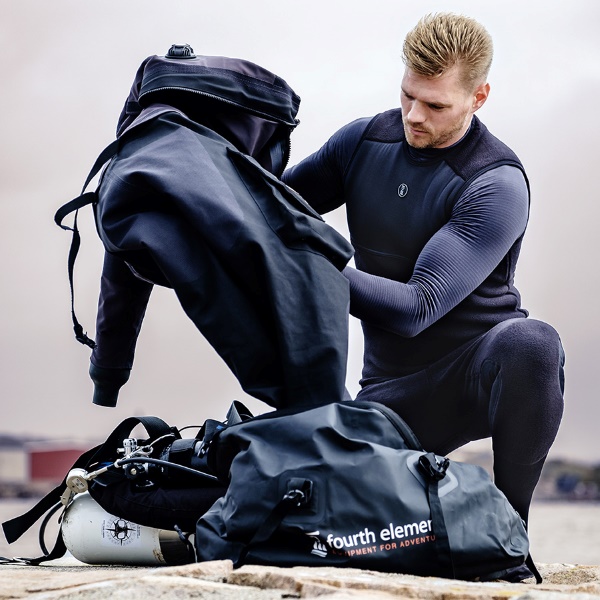
Picture this: You're about to take the plunge on a long-awaited dive trip, but your trusty mask decides to fog up like a windshield in a sauna. Or maybe your BCD inflator gets a mind of its own, turning your leisurely descent into a rocket launch to the surface. Not exactly the underwater adventure you had in mind, right?
Here at Dive Right In Scuba, we've witnessed our fair share of gear malfunctions – some hilarious, some downright scary. But fear not, fellow divers! We're here to equip you with the knowledge and tools to keep your gear in tip-top shape and prevent those unexpected surprises. After all, your dive gear is an investment, and who doesn't love getting the most bang for their buck?
So, grab your dive tool kit (or a trusty butter knife) and let's get down to business!
Rinse and Repeat: The Golden Rule of Dive Gear Care
Just like you wouldn't skip your post-workout shower (or at least, we hope you wouldn't), your dive gear needs a good rinse after every salty adventure. Saltwater is like kryptonite for your gear, causing corrosion, rust, and all sorts of unpleasant surprises.
So, after each dive, give your gear a thorough freshwater bath. This means everything – your regulator, BCD, wetsuit, mask, fins, the whole shebang! If you're feeling extra fancy, you can even soak your gear in a tub of freshwater for a deeper clean. Trust us, your gear will thank you (even if it can't actually talk).
And hey, freshwater divers, don't think you're off the hook! Even though you're not dealing with saltwater, your gear still needs a rinse to remove dirt, grime, and other unwanted souvenirs from your dive.
Dry It Out: The Key to Preventing Mold and Mildew
Now that your gear is squeaky clean, it's time for a little air therapy. Proper drying is crucial for preventing mold and mildew, which can not only stink up your gear but also damage it over time.
Hang your wetsuit and BCD to dry in a well-ventilated area, away from direct sunlight (because, you know, sunburns aren't just for humans). For neoprene items like wetsuits and boots, turn them inside out to speed up the drying process.
Speaking of wetsuits, have you ever forgotten one in your gear bag for a few days? If so, you might have discovered a new species of mold growing in the dark recesses of your dive bag. Yuck! So, do your gear (and your nose) a favor and always make sure everything is completely dry before storing it.
Lubricate and Liberate: Keeping Your Gear Moving Smoothly
Just like a well-oiled machine, your dive gear needs a little lubrication to keep it functioning smoothly. O-rings, seals, zippers, and other moving parts can get sticky and corroded if left unattended.
Grab some silicone grease (it's like lotion for your gear) and give those O-rings and seals a good massage. A light coat of wax or lubricant on your zippers will prevent them from seizing up and make your life a whole lot easier when you're trying to get dressed for your next dive. Just remember, a little lube goes a long way.
A well-maintained piece of gear won't just perform better, it'll also be less likely to squeak and groan like an old pirate ship.
Inspect & Detect: Spotting Trouble Before It Starts
Ever heard the saying, "An ounce of prevention is worth a pound of cure"? Well, it applies to dive gear too! Regular inspections can help you catch minor issues before they turn into major problems.
Before and after each dive, give your gear a thorough once-over. Look for signs of wear and tear, like fraying straps, cracked hoses, or loose buckles. Check for leaks in your BCD, regulator, and drysuit (a little soap and water can help you spot bubbles). And don't forget to inspect metal parts for any signs of corrosion or rust.
Think of yourself as a gear detective, searching for clues that could save you from a frustrating (or even dangerous) equipment malfunction.
Store It Right: Your Gear's Happy Place
After a long day of exploring the underwater world, your gear deserves a comfy place to rest and recharge. Store it in a cool, dry, and dark place, away from direct sunlight and heat.
Hang your wetsuit and BCD on hangers to help them maintain their shape and prevent creases. Avoid stacking heavy items on top of delicate gear, as this can cause damage. And if you're storing your regulator, make sure to keep the first stage upright to prevent any internal fluids from leaking out.
Remember, your gear is your trusty companion in your underwater adventures. Treat it well, and it'll be by your side for many dives to come!
When DIY Isn't Enough: Calling in the Pros
Even the most dedicated DIY enthusiast has their limits. Some gear repairs require specialized tools, knowledge, and experience. If you're ever unsure about how to fix something, don't hesitate to bring your gear to the experts at Dive Right In Scuba. We can handle everything from minor repairs to major overhauls, ensuring your gear is safe and reliable for your next dive.
And don't forget to schedule regular professional servicing for your regulator and other vital equipment. It's like taking your car in for an oil change – a little preventative maintenance goes a long way in ensuring optimal performance and longevity.
Bonus: Gear Care Travel Tips
If you're planning a dive trip, here are a few tips to keep your gear safe and sound during your travels:
- Packing: Protect your gear by padding it with towels or bubble wrap and using a sturdy gear bag.
- Rinsing on the Go: If you don't have access to fresh water, rinse your gear with bottled water or take it to a hotel shower for a quick wash.
Gear Up and Dive In: Keep Your Equipment in Top Shape
Your scuba gear is an investment in your underwater adventures. By following these simple maintenance tips, you can extend the life of your gear, ensure your safety, and maximize your enjoyment in the underwater world. Remember, a little TLC goes a long way!
And if you ever need a helping hand, the experts at Dive Right In Scuba are here to help with all your gear maintenance and repair needs. Check out our blog post 7 Signs Your Dive Gear Needs Professional Repair for more information, stop by our store to chat with our friendly and knowledgeable staff, or send us over an email with any questions you may have.
Happy diving!
